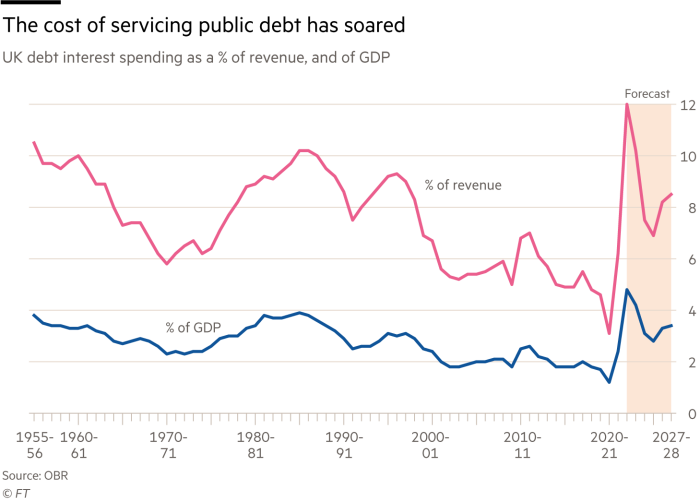[ad_1]
Jeremy Hunt’s Autumn Statement had two audiences: creditors and voters. It needed to convince the former that the UK government can be trusted with their money and it needed to convince the latter that the Conservative government is doing its best to limit the damage to them and their families from a global economic storm.
So far the chancellor seems to be doing rather well on the first objective. Nonetheless, the costs of debt service have risen substantially. The government has taken sizeable actions to deliver on the second, too. But the blow to household real disposable incomes will still be enormous. Meanwhile, he has adopted yet another set of fiscal targets and pushed the austerity designed to achieve them into the years after the next election. Those promises of future fiscal chastity cannot be taken seriously. They may or may not be delivered. But no parliament can bind its successor.
What is certain is the impact of the Russian aggression against Ukraine. This is the main explanation for the huge revisions in the Office for Budget Responsibility’s forecasts since last March. The decision of Liz Truss and Kwasi Kwarteng to launch large unfunded tax cuts and spending increases at such a juncture, while repudiating input from the OBR and the Bank of England, was insane. Hunt went out of his way to laud these institutions: sanity, he emphasised, is back. So far, happily, creditors agree. The so-called “moron premium” on UK bond yields has melted away. Nevertheless, the jump in debt service costs will be huge: according to the OBR, government spending on interest will jump from 1.2 per cent of gross domestic product in 2020-21 to 4.8 per cent in 2022-23.

The rise in interest rates is a response to inflationary pressures. These are just one of the economic problems caused or exacerbated by the global jump in energy prices, which itself came on top of the post-Covid rise in the prices of goods. The energy shock is not just inflationary. It is also contractionary for GDP and even more so for real incomes, since it has increased the cost of imports hugely relative to those for exports. The result is a huge fall in forecast economic growth and an even more dramatic squeeze on household incomes.
The elements in this overall picture are startling. The OBR expects inflation to peak at a 40-year high of 11.1 per cent in the fourth quarter of 2022, revised up from a forecast of 8.7 per cent in March. It also expects the economy to enter a recession lasting just over a year from the third quarter of 2022 (namely, now). By the first quarter of 2027, it says, “cumulative growth in real GDP since the fourth quarter of 2019 is 3.4 percentage points lower than in our March forecast”; 2.4 percentage points of this is due to lower cumulative growth over the forecast period. Moreover, the bulk of that is due to lower potential growth and so is likely to be permanent.

Worst of all is what is going to happen to household real disposable incomes. “On a fiscal year basis,” says the OBR, these fall “by 4.3 per cent in 2022-23, which would be the largest since ONS records began in 1956-57. That is followed by the second largest fall in 2023-24 at 2.8 per cent.”
These huge reductions in living standards occur despite massive spending on support: the fiscal measures since March are forecast to raise real household disposable incomes per person by 4.5 per cent in 2022-23 and 2.5 per cent in 2023-24. The impact on the public finances comes not only from the recession, but also from spending targeted at reducing the burden on households. Additional spending announced since March amounts to £103bn from 2022-23 to 2024-25. The offsetting increases in taxes and cuts in spending only begin from 2024-25 (for taxes) and 2025-26 (for spending). The government will be giving away money hugely over the two years running up to the election. Fiscal targets will, not surprisingly, be missed once again. Indeed, public sector net debt is now forecast to hit a 63-year high of 97.6 per cent of GDP in 2026-27, against a forecast of 78.9 per cent only last March. This is indeed a huge storm.

Is there some good news? Yes, the OBR thinks inflation may go negative in 2024. If so, interest rates might plummet. The Ukraine war might end sooner than is now expected, though the chances that this will reverse the squeeze on gas supplies look small. In all, this is about weathering a storm that will be very painful for a large portion of the public. Could the government have done more to cushion the blow? Only by being willing to raise taxes even more.
The longer run questions are almost inevitably left to one side. There is certainly nothing to suggest radical new thinking on growth. Worse, the crisis is imposing a big hit to already weak business investment, while the government plans to cut capital spending, too. These cuts are sure to show up in longer-term weakness in potential output.
Yet there are things that can be done cheaply. The most important achievement of Hunt and Rishi Sunak is to reintroduce a degree of coherence and predictability into policymaking. That must surely now be extended to our relationship with our most important economic partner, the EU. The era of Brexit fantasy needs at last to be put behind us. At the very least, and especially at a time of such radical uncertainty, the doubts over future trading relationships must be ended. So, let us agree on Northern Ireland, abandon totemic discord, reach as close and credibly stable an economic relationship with the EU as is possible, and then move on. It is high time for us to do so.
[ad_2]
Source link
